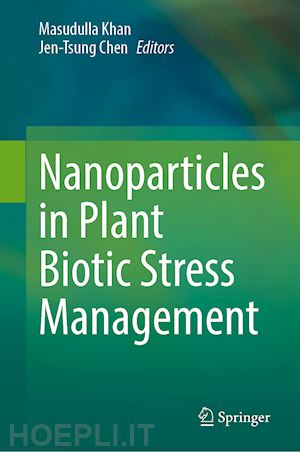
Questo prodotto usufruisce delle SPEDIZIONI GRATIS
selezionando l'opzione Corriere Veloce in fase di ordine.
Pagabile anche con Carta della cultura giovani e del merito, 18App Bonus Cultura e Carta del Docente
Chapter 1. A prospective analysis of the interaction of nanoparticles with phyto-pathogens and Plants: Their Impact on Plant Health.- Chapter 2. Impact of nanopriming on Physio-Biochemical and defense process of Plants against pathogens.- Chapter 3. Formulation of novel nano based pesticides and fertilizers their role in mitigating the biotic stresses of crops.- Chapter 4. Application of nanomaterials in managing biotic stress of plants induced by phyto-pathogenic fungi.- Chapter 5. Application of nanomaterials in managing biotic stress of plants induced by pathogenic bacteria.- Chapter 6. Role of different nanomaterials in managing biotic stress of plants induced by pathogenic insect, viruses and phytoparasitic nematodes.- Chapter 7. Nanofertilizers: Synthesis, Applications, Chemistry and transport in plants.- Chapter 8. Phyto-assisted synthesized metal nanoparticles and their effect in inducing defense response in plants.- Chapter 9. Fungi-assisted synthesis of nanoparticles and their effect on plant pathogens.- Chapter 10. Bacteria assisted synthesis of nanoparticles and their effect on plants and phytopathogens.- Chapter 11. Elucidating the role of Silicon and Titanium nanoparticles in reducing the biotic stress of plants.- Chapter 12. Seed priming and spraying with Zinc Oxide and Copper Oxide mitigates disease in crop plants and induces resistance against pathogens.- Chapter 13. Role of Magnesium oxide, Magnese, Gold and Nickle nanoparticles in crop production.
Dr. Masudulla Khan, Assistant Professor of Botany, Women's College, Aligarh Muslim University, India
Dr. Khan is working as an assistant professor of Botany at Women’s College, Aligarh Muslim University, India. He received a Ph.D. degree in Botany from Aligarh Muslim University in 2019. Dr. Khan qualified Junior Research Fellowship (CSIR/UGC- NET/JRF/SRF) Exam in 2014 with a 67 rank conducted by the Council of Scientific and Industrial Research/University Grant Commission. He also qualified National Eligibility Test Exam conducted by the Indian Council of Agricultural Research/Agriculture Scientist Recruitment Board (ICAR/ASRB-NET, 2018). Dr. Khan is working on the research field of plant disease complexes including nematodes, fungi, and bacteria and their management. Currently, he focuses on the sustainable management of plant diseases by developing novel eco-friendly pesticides. Dr. Khan has published research articles in reputed journals and has considerable experience in sharing his research findings at national as well as international conferences and seminars.
Jen-Tsung Chen, Ph.D., Professor, Department of Life Sciences, National University of Kaohsiung, Taiwan
Jen-Tsung Chen is a professor of cell biology at the National University of Kaohsiung in Taiwan. He also teaches genomics, proteomics, plant physiology, and plant biotechnology. Dr. Chen’s research interests include bioactive compounds, chromatography techniques, plant molecular biology, plant biotechnology, bioinformatics, and systems pharmacology. He is an active editor of academic books and journals to advance the exploration of multidisciplinary knowledge involving plant physiology, plant biotechnology, nanotechnology, ethnopharmacology, and systems biology. He serves as an editorial board member and a guest editor in reputed journals. Dr. Chen published books in collaboration with international publishers and he is handling book projects on diverse topics such as drug discovery, herbal medicine, medicinal biotechnology, nanotechnology, bioengineering, plant functional genomics, plant speed breeding, epigenetics, functional RNAs, and CRISPR-based plant genome editing. Dr. Chen has been included in the World's Top 2% Scientists 2023 by Stanford University.











Il sito utilizza cookie ed altri strumenti di tracciamento che raccolgono informazioni dal dispositivo dell’utente. Oltre ai cookie tecnici ed analitici aggregati, strettamente necessari per il funzionamento di questo sito web, previo consenso dell’utente possono essere installati cookie di profilazione e marketing e cookie dei social media. Cliccando su “Accetto tutti i cookie” saranno attivate tutte le categorie di cookie. Per accettare solo deterninate categorie di cookie, cliccare invece su “Impostazioni cookie”. Chiudendo il banner o continuando a navigare saranno installati solo cookie tecnici. Per maggiori dettagli, consultare la Cookie Policy.